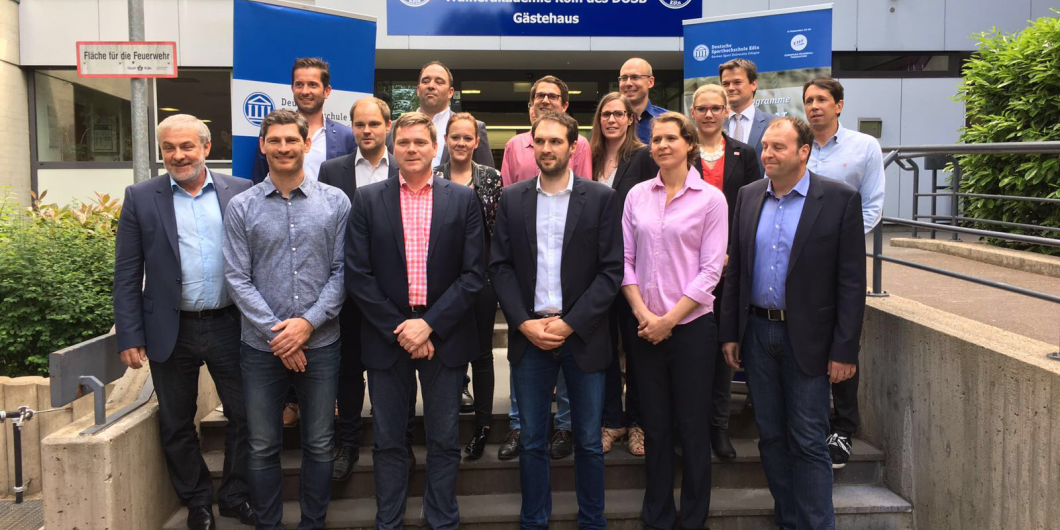Without a coaching licence, one cannot coach a team. Without the proper qualification, one cannot become a referee – but what about handball club managers?
To date an adequate education, matching the demands of national and international handball, for the people responsible for the clubs’ and federations’ business side of things does not exist – but things are about to change.
Starting in 2015 the European Handball Federation together with the German Sports University Cologne offer a one-year European Handball Manager course, and the interest was huge.
“We did not imagine such a huge feedback. It shows that there was the need for such a course,” says Helmut Höritsch, who is responsible for the project on the side of the EHF.
Big name students
The course is offered in German and English in alternating years, in the first year big names of handball such as the Champions League winners Holger Glandorf and Grit Jurack and World Champion Henning Fritz as well as several club managers were the trailblazers.
In the second year, Spanish legend Iker Romero and former Danish international Lasse Boesen are among the participants. Club managers are the primary target group, but federation managers are also eligible to apply.
“When players or coaches turn into managers, they often lack the basics of accounting, licencing or sports law,” says Dr. Stefan Walzel of the Institute of Sports Economy and Management at the German Sports University.
Walzel is the academic responsible for the studies. His institute is a long-time partner of the EHF. Together they have been organising the club manager seminars on the fringes of the VELUX EHF FINAL4.
“The EHF as well as Forum Club Handball have seen the need to give the management side of things more attention," says Walzel.
"A club’s economic success is as important as the success on the court.” Every course consists of five modules: Basics in economics and law, handball management, marketing and sponsoring, finances and licencing as well as media and communications.
Besides the education aspect, the organisers stress that the participants share best practice examples from their daily business.
“There are many former players who did not have the possibility to finish a university degree or another form of education during their career, but they want to stay connected to handball,” says Höritsch.
Positive feedback after first year
And the feedback after the first year of the European Handball Manager was more than satisfying: “This course offers the great opportunity to implement basic knowledge into our daily work,” said Axel Geerken who is the club manager of Bundesliga side MT Melsungen, who was awarded with the certificate of honour as the best graduate of the first course.
TSV Hannover-Burgdorf manager Benjamin Chatton praised the course lecturers: “All of them play in the first league of their respective field of work.
And Grit Jurack, who was supported by the Women’s Handball Board to be part of the course, called it a comprehensive package for handball managers. “You learn a lot and on top you expand your professional and personal network,” she said.
The EHF were happy with the start, too: “It is the right way to contribute to this study by investing into the successful future of handball and its management,” said EHF Secretary General, Michael Wiederer.
On the fringes of the 2016 edition of the VELUX EHF FINAL4 and after successfully passing their exams, 15 new European Handball Managers received their certificates.
Theawarding was made by a group of Members of EU Parliament and EU Commission including former Polish Handball national team coach Bogdan Wenta, EHF President Jean Brihault, EHF SecretaryGeneral Michael Wiederer as well as Helmut Höritsch (EHF Competence Network) and Carmen Manchado (EHF Women’s Handball Board).
Professionalising handball management
“This study guarantees education and sustainability in European handball. The original idea was addressed to us by the clubs and thanks to the great cooperation we finally managed to implement those studies, We are proud of this great cooperation with the German Sports University,” said Jean Brihault.
One of those initiators was Gerd Butzeck, Director of the Forum Club Handball. He said: “We had started our initiative two years ago and these studies will bring handball forward in future, will professionalise this sport.
“The programme, conducted by the German Sports University, is much better than the manager programme in basketball and the planned programme in football,” he continued.
Programme Director Dr. Stefan Walzel was highly satisfied with the outcome too: “We can be proud of this course and our achievement, as handball now is the role model for other European sports.
“Those new European Handball Managers are the best ambassadors for the programme. All graduates did a great job parallel to their demanding jobs at clubs or federations,” he surmised.


